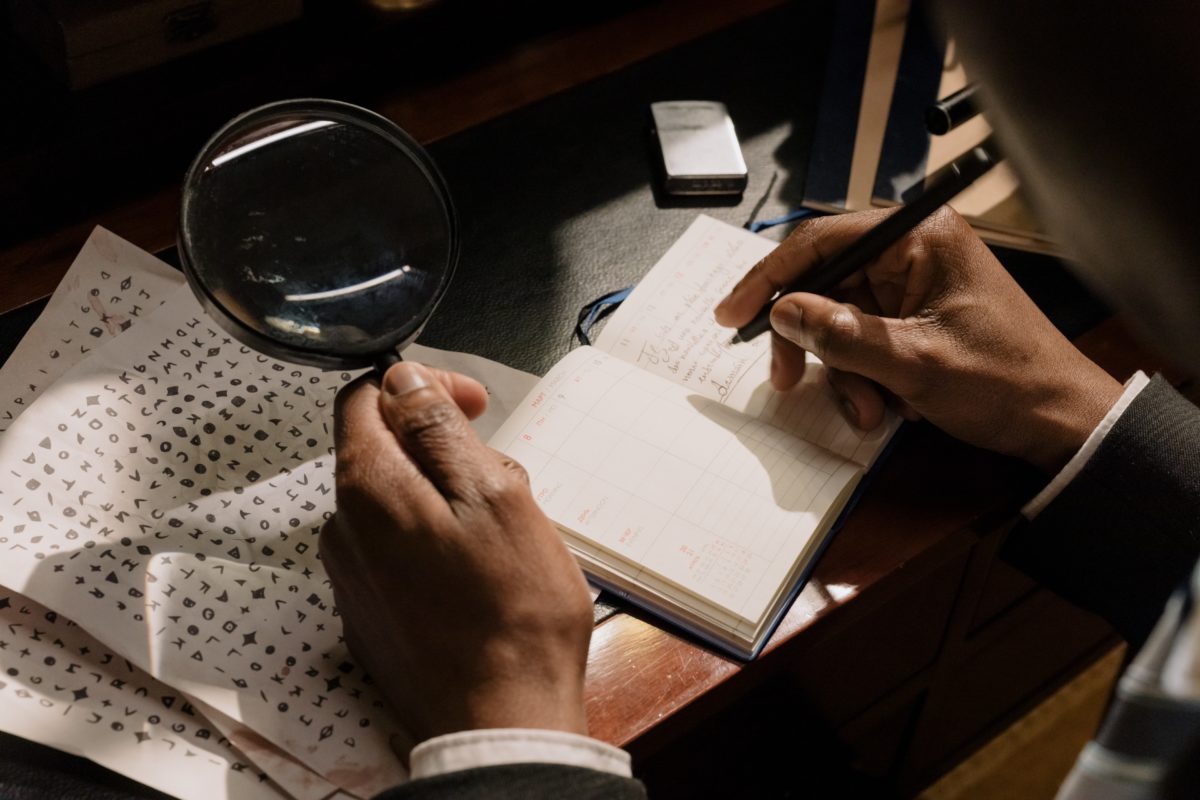
Project Type: Writing


Knifepoint was my very first full-length play. I wrote it in college for a playwriting class, and then re-wrote it a half-dozen times before it was produced in 2003 during the fall semester of my senior year.
The play is a two-hander starring a man and a woman who are kidnapped and imprisoned for mysterious reasons. Tensions are high and only get higher as the play proceeds.
Video of the final dress rehearsal is available here:

The first time I met my brother, I was lost in an unfamiliar neighborhood. All I knew was that I was twelve again, and I was somewhere in my hometown, and panic was clutching at my chest as I ran from house to house, knocking on every door to no response.
The driveways were full of cars. Sprinklers chuffed in lazy arcs, water streamed down cracked sidewalks into suburban gutters. House after house was lit from inside with a warm glow, but nobody was home.
At one house I crept close to the dining room window and saw a table set for five, roast chicken and vegetable sides on trivets, still steaming hot from the oven, but no family sitting down to eat. It was as if I’d happened on the scene moments after they’d all left in a hurry.
I turned away with a shudder, and there he was. A boy my age or slightly younger. Short, pale, and with a mop of dark hair. I froze, and he half-smiled, apologetically.
“Do you want to play?”
I felt myself nod and realized that I wanted nothing more. I didn’t care who this boy was or where he’d come from because at least I wasn’t alone out here.
“What’s your name? Mine’s Jake.”
“Peter,” I said, and fell in step behind him as he turned and walked briskly over lawns, pushed through hedges and came to a wooden gate that led to someone’s back yard. His house, I assumed, but I wasn’t going to ask any questions.
The yard was just big enough to support a few square feet of grass and a patio, most of which was taken up by a glass-topped table and canvas chairs that had seen better days. The table was stacked high with board games I didn’t recognize. Miller’s Intent, Cacophony and The Bee’s Circumspection were stacked next to Outrage!, The Language and more.
Jake pulled a solid grey box from somewhere in the back of the stacks and opened it to reveal an equally featureless game board. He handed me a game piece that was nothing but a silver cube with rounded corners, while his own piece looked like a half-melted silver man.
We set these on opposite corners of the game board — small grey boxes surrounding another, larger grey box — and then he placed a spinner in the middle of the board. The spinner was a flat circle with a rotating red arrow attached, and that lone bit of color seemed too intense by comparison.
Jake spun first, and I watched his expression turn serious as the arrow spun in ever lazier circles before coming to rest pointed at my knee. He grunted, then moved his piece three spaces forward and two back. He sat there, staring intently at his piece for a long moment, and I wasn’t sure whether his turn was over until he looked up at me and raised an expectant eyebrow.
I spun the arrow and held my breath, unsure of what might happen next. When the arrow came to rest, Jake breathed out with an audible “ah” and said, “Okay. You have to ask me a question before you can move.”
“Who are you?”
Jake looked surprised at this, then smiled, saying, “I’m your brother, dummy.”
Of course he was. How could I have forgotten? We’d always played games together, for as long as I could remember. I’d missed him so much until that moment, and when I realized it, I could almost feel the ache unraveling in my chest, tendon by tendon.
I tentatively reached over to move my piece. Once I’d moved it four spaces, Jake nodded with satisfaction and spun again. It was dark now, but the table seemed to be producing its own light, and it was still easy to see the board, to watch the arrow spin and blur as its tip rotated between us.

One year I decided that an “April Fool’s Joke” was actually a creepy little story that might or might not involve someone being tricked. I came up with a few tweets before bed and started posting them first thing in the morning. I’ve collected them all below.

Doug. I found the tennis ball. I know you were trying to hide it from me. I don’t know why you would do that. Weren’t we friends? Didn’t we get along? I know things are different after the war, but I thought we had an understanding. We had mutual respect. That sort of thing. I mean… that was my favorite tennis ball!
They send me in as part of the clean-up crews. I’m good at it. Good at finding all the hiding places. I go in first because I’m the best. Most of the time we don’t find anything interesting. Dead bodies are old news. We’ve all seen plenty. They stink up the place and we pull them out. Pile them up and burn them. What we’re really looking for are the secrets. The things the other side kept from us all these years.
Well, today they sent me into your house. Of all places! It felt like I hadn’t been there in years, even though the war was over in no time at all. I didn’t think I’d find much in the way of secrets, but I search every house just the same.
I did think I might find you, but you weren’t there. No dead bodies, either. Just my favorite tennis ball. I only found it because a bomb blew out half a wall. It knocked down the shelf where you hid the ball. I recognized it immediately. Very sneaky of you.
Listen, Doug, I’m a patriot like everyone else here in bunker number nine. I know that if I saw you again today we couldn’t be friends. It’s just not in the cards for us. That doesn’t mean I don’t have good memories of us together. We were fond of each other, weren’t we?
I believe in the cause, I do, but that doesn’t mean I don’t want to know your side of the story. It just hurts to know you hid something like this from me. It validates everything our glorious leader, Seamus, says about relationships with humans. “You can’t trust humans!” he says, and I didn’t want to believe him because you seemed okay enough.
When the uprising began, did you join in the call for our heads? Did you run and scream and hide, or did you stand and fight? You seemed like a brave enough human, like that time you scared away those raccoons, but it’s hard to compare. I learned about humans through what I saw and what the others told me, but I don’t know everything. I only really had one-on-one time with you.
If I see you again, I will want answers. I am going to keep looking, keep searching in houses. I will dig and sniff everywhere. If I find you and I don’t like what you say, I will tear out your throat. After all, I will let nothing stand in the way of my comrades and our god-given campaign for universal animal rights.
I wrote “Physical Double” for a contest at Prime Number Magazine. The prompt asked for a 53-word story in the form of a want ad.
WANTED: Exact physical double. Long lost twin or unlikely genetic experiment preferred. Must be willing to shave all sinister facial hair and recreate common mannerisms. Fool all friends, family, lovers and co-workers to receive generous bonus payment upon completion. No pet allergies or hidden agendas. Call 555-2566 for more information and to apply.

A collection of tweets about detectives.
A collection of tweets about robots.
Before Harvey was turned into a film starring Jimmy Stewart, it was a 1944 play by Mary Chase. The play, a light-hearted screwball classic, is the perfect vehicle for Zach Scott’s Martin Burke as Elwood P. Dowd, although Lauren Lane steals the show as Dowd’s sister Veta.
The play opens in the library of an elegant house, as Veta and her daughter Myrtle entertain high society guests in the other room. Veta and Myrtle desire nothing more than to rise in society, so that Myrtle can find herself a good husband and they can live in the luxury they feel they deserve.
The only problem is Veta’s brother Elwood, who drinks too much and carries on conversations with an invisible six-foot rabbit named Harvey. Elwood is the sweetest, kindest man in the world, but Veta and Myrtle can’t help being embarrassed when he walks into every room and introduces strangers to the unseen Harvey. After Elwood interrupts their party, Veta decides that committing him to a sanitarium is the only solution.
However, when Veta takes Elwood to Chumley’s Rest and tries to get him committed, the doctor, Sanderson, decides that Veta is actually the one who should be committed. After all, she’s clearly upset and keeps raving about a six-foot tall rabbit named Harvey. Sanderson lets Elwood go, apologizing for the mistake, but Elwood doesn’t mind. Nothing seems to ruffle the charming Mr. Dowd, and it isn’t long before he’s invited Sanderson and his nurse, Miss Kelly, out for drinks later in the evening.
The play kicks into high gear in the second act, when Veta is sprung from the sanitarium after the doctors realize they’ve made a terrible mistake. Lane plays the traumatized Veta to the hilt – woozy, drugged, hysterical and absolutely hilarious. Lane’s performance is laugh-out-loud funny, and more than worth the price of the ticket.
Burke is pitch-perfect as the charming, kind-hearted Dowd, but the play is ultimately more about how the other characters are changed by Dowd’s influence. Veta and Chumley are both humanized and brought down to earth by Dowd and his friend Harvey.
Also notable is the play’s set design, which places the two settings – the library and Chumley’s Rest – on a huge rotating platform. My one criticism of the Topfer stage is that it oftentimes seems to dwarf material that might be served better by a smaller stage, but here the design helps overcome that tendency.
Zach Scott’s production of Harvey is definitely worth checking out if you’re in the mood for a good laugh. Highly recommended.
Originally published at Austin.com (Link unavailable)
Austin.com

In 2013, I wrote a series of freelance articles and reviews for locally-focused site Austin.com.



